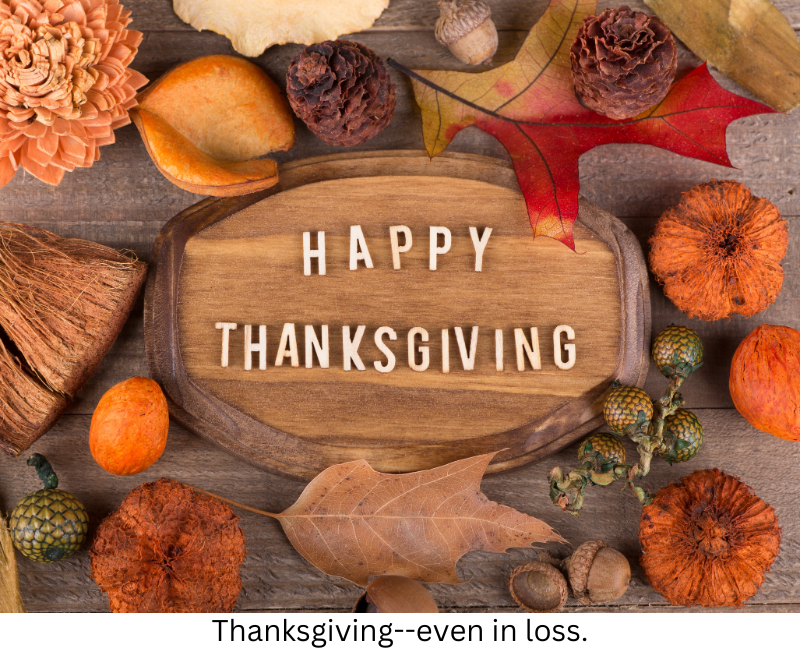As Ken tossed the jack-o-lanterns from the porch, his phone buzzed. His sister texted her excitement over seeing him at Thanksgiving. As he read, pain and confusion engulfed Ken. How could he go to his parents without Jen? Without the kids? He just lost his family and his home. What was there to be thankful for? Ken, and all those experiencing divorce need to know—there can be thanksgiving, even in divorce.
When humans go through trauma (like divorce), we tend to believe it threatens everything (global) and lasts forever (eternal). It takes real effort to see a different context.
Thanksgiving offers a perfect setting to do just that. While the loss is real, divorce isn’t global or eternal. Giving thanks for what remains and what may come offers hope—even in the midst of pain.
Why even bother with thanksgiving?
Research has found multiple benefits for choosing to be grateful. Yes—choosing.
None of us is born grateful. Yet, for those who stop to recognize something positive and say “thank you,” huge benefits flow.
- Longer lifespan—You can add 7 years to your life by simply being grateful. (About the same as stopping smoking.)
- Increased resilience—Having come through one of the toughest challenges life brings—this benefit helps you adjust to moving forward.
- Better performance at work—Because gratitude brings higher self-esteem (another proven benefit), people perform better. Focusing on the positive brings creativity, more insight to options, and more dedication to a task by believing “good” will result.
- Better health—Thankfulness leads to better sleep and less stress, resulting in better overall health.
- More empathy—Grateful people tend to share and tend to notice. These traits create empathy for others, which then leads to more meaningful relationships.
Given the benefits of thankfulness—why not? So how?
How do I become thankful?
Though being thankful doesn’t come naturally, it’s not hard. Giving thanks is simply the conscious act of pausing through the day to notice what is good and say, “Thank you to the One who gives.” So, how can Ken, who feels like he just lost everything good, find anything for which to give thanks?
Give thanks for what remains.
When the reality of loss starts to overwhelm her clients, a fellow mediator asks, “What else is there?” That’s a powerful question. Amidst the loss—what else is there? Make a list. Then, go down the list saying “Thank you” for each one.
- Home—Whether you get to keep the house, must move, or are living with relatives—if you have a place to lay your head, be thankful. Clients often find their own place provides sanctuary and rest. “I can finally breathe,” one client said. “I didn’t realize how tense I had been until I was able to go to sleep without wondering where she was or what might happen.”
- Family/friends—While some may have fallen away, those who supported you are true. Give thanks for them and engage with them.
- Job—If you have a job—give thanks. Many would be grateful to have yours. If you must look for a job—be thankful for your skills, interests, and people in your corner.
Give thanks for what may come.
Marriage requires blending lives. Most must give up at least some of their hobbies, friendships, even vocations to advance the marriage.
While divorce brings many unwanted changes—it also offers opportunity to reinvest in what was set aside or to explore new interests.
- Relationships—Whether you connect with old friends or enter new communities, your new life brings the opportunity for new relationships. One former client moved to a neighborhood where she found a monthly dinner club, an exercise group, and a volunteer endeavor. “I haven’t been this connected in years!” she exclaimed. “Trying to fix my marriage took all my energy. I just holed up. Now I’m doing things. People like me. I forgot that. I feel alive again.”
- Hobbies/interests—You have the chance to pull the old guitar from the back of the closet or sign up for the climbing class that caught your eye but took too much time. You can volunteer for a ministry or explore education to advance your career or interests. You can now opt to travel to the dude ranch, backwoods campground, or exotic beach your spouse had no desire to experience. In short—you have a bit of a blank slate to begin writing your story anew. Yes, the backstory remains. But, you get a bit of a do-over. Without having to check with, work with, or agree with someone else—you can chart a new course.
- Deeper connection to children—Parents often find they are able to be “more themselves” when parenting from separate homes. The disconnect between spouses often bleeds into disconnect in every area of life—including parenting. Especially if the other parent was more primary, the parent who wants to engage more deeply now has a chance to do so. This leads to deeper, more authentic relationships with children.
Divorce is brings loss. Loss felt more keenly at events like Thanksgiving dinner. But, ironically, the act of giving thanks can actually help heal the pain of loss and bring hope. Whether you join with family and friends or take the day to simply be–we hope you can find comfort in what you do still have and for what may come.
If you would like more information on navigating divorce, contact Resolution Mediation by clicking HERE or calling 317-793-0825. We look forward to serving you.
As always, the above is for information only. Seek a divorce professional for guidance in your personal situation.


